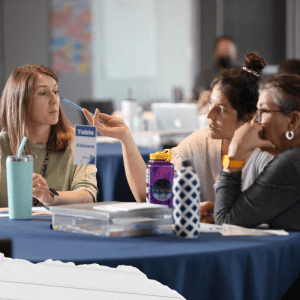
Field Notes: Chicago’s Skyline Curriculum Implementation
06/15/2023

Introducing Field Notes
![]() The past few years have been filled with some discouraging news about education. However, we have seen much of the opposite first-hand. Our partners across the country—visionary K-12 educators, instructional leaders, and district decision-makers —are proving what’s possible for students by making smart instructional moves at a time of high stakes.
The past few years have been filled with some discouraging news about education. However, we have seen much of the opposite first-hand. Our partners across the country—visionary K-12 educators, instructional leaders, and district decision-makers —are proving what’s possible for students by making smart instructional moves at a time of high stakes.
We’re shining a light on these inspirational examples in a new blog series to illuminate paths forward toward the fair future all of our students deserve. First up, we look to Chicago Public Schools, where the district is closing out its second year of implementing an innovative, Chicago-specific curriculum known as Skyline. Jess Jenkins, a Director for the partnership, will take it from here!
Curriculum can be exciting!
Curriculum itself isn’t known as the most exciting topic on the surface. It’s often seen as murky, unwieldy, and hard to comprehend. However you think of it, I hope I can help you see it in a new light by the end of this piece.
In a highly fragmented education system where many individual inputs can vary drastically from city to city, school to school, and even classroom to classroom, curriculum promises consistency and continuity. On the most basic level, it’s a set of agreements about knowledge and skills a school or district expects students to learn. Often, it includes objectives, lessons, and assessments.
Many educators are skeptical of school and district-provided curricula, seeing them as a script or way of “dumbing down” their job, but the best versions free teachers up to focus more of their time and creativity on bringing engaging lessons to life rather than figuring out what they should be teaching (check out EdReports for more on this!). Chicago’s new Skyline curriculum fits in that camp.
About Skyline, Chicago Public Schools’ Ambitious New Curriculum
Chicago Public Schools developed a strategy for all schools to adopt a high-quality curriculum that provides a rigorous education for all students. All schools are required to provide evidence that their curriculum is:
- Standards-aligned
- Horizontally-aligned across instructional and assessment materials
- Vertically-aligned across grade bands (PreK-2, 3-5, 6-8, HS)
- Accessible for all learners as aligned to Universal Design for Learning, and supportive of differentiation for students, including English learners and diverse learners
- Supportive of students’ social-emotional learning
- Culturally responsive
The district’s new online Skyline Curriculum provides all CPS schools with the tools and resources to achieve high-quality curriculum adoption. Skyline sets a new standard for instructional materials by building upon grade-level standards and learning science to uniquely connect with the identities and experiences of Chicago’s students. Leading Educators was brought in to support successful adoption after several years of previous collaboration to expand opportunities for students to do challenging and relevant work.
Over the past two years, we’ve provided Skyline school-based support to a subset of Chicago Public Schools to advance the district’s curriculum goals. Next year, we’re supporting more schools that are using a range of curricular resources.
What Makes Curriculum Implementation Go Well?
One big reason why curriculum efforts fail is the implementation, not the materials themselves. New materials can feel overwhelming to internalize. There’s often limited time to practice and adjust. It’s hard to shift away from the habit of supplementation and seeking out other materials. It can feel like a loss of choice.
To address some of these challenges, we’ve worked with a teacher-driven Networked Improvement Community to leverage improvement science principles in the implementation of Skyline math in middle grades. Our Skyline school-based supports team works with eight schools across CPS, coaching school leaders to implement distributed leadership models and building the capacity of teacher leaders.
Within other Chicago schools, we offer curriculum-agnostic coaching for leaders on implementing distributed leadership models that build teacher and teacher leaders’ capacity to facilitate ongoing, curriculum-based professional learning. That means more teachers have timely and relevant opportunities to develop skills, knowledge, and confidence in using their respective materials to build upon students’ strengths.
Celebrating Wins
After spending much of last year focused on the use of the Skyline resource itself, we’re seeing our efforts pay off.
- At the end of the last school year, two-thirds of teachers were implementing Skyline during classroom visits.
- By the midpoint of this school year, we saw 93% of classrooms implementing Skyline–meaning students are experiencing culturally relevant curriculum and have greater access to complex texts.
Building on Strengths, Making Adjustments
This spring, we saw far greater resource use, but teachers needed continued support to implement the materials skillfully and shift the cognitive lift to students. Many teacher leaders are not yet confident in their own implementation of the curriculum. Therefore, some were hesitant to lead learning for their peers. We made some adjustments to coaching priorities, and our team continues to provide considerable support through leading learning, planning, and student work analysis.
We’re hopeful that a stronger understanding of high-quality instructional practices and aligned implementation will improve teacher practice and create the conditions needed for school leaders to identify teacher leaders. We adjusted our approach with schools to make that happen–targeting learning around equitable practices, tailoring materials to more appropriately meet school needs, and supporting school leaders to champion learning cycles in their buildings.
Looking ahead, we will continue collaborating with school teams to create learning plans that include professional learning and coaching for both the leadership teams and identified teachers so content knowledge and skill with curriculum implementation grows.
While You’re Here
Check out our research on our previous work in Chicago to expand distributed leadership and implement content-based professional learning. A randomized control trial by RAND Corporation shows that educators significantly increased student achievement after participating in Leading Educators’ Chicago-based PD program. An average teacher rose to the top third of effectiveness after participation.
These findings challenge the misconception that teacher professional development is ineffective and costly—the content and components matter. A smarter PD approach = a smart investment.
Take Your Next Step
Are you seeking curriculum implementation, professional learning, or instructional strategy support? Send us a note to connect with our Partnerships team and learn how we can help.







